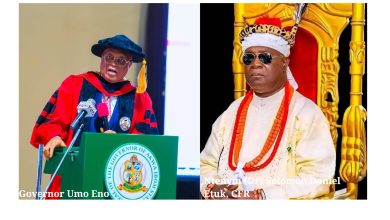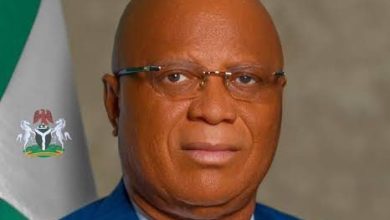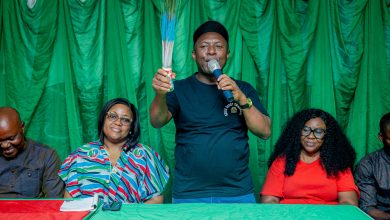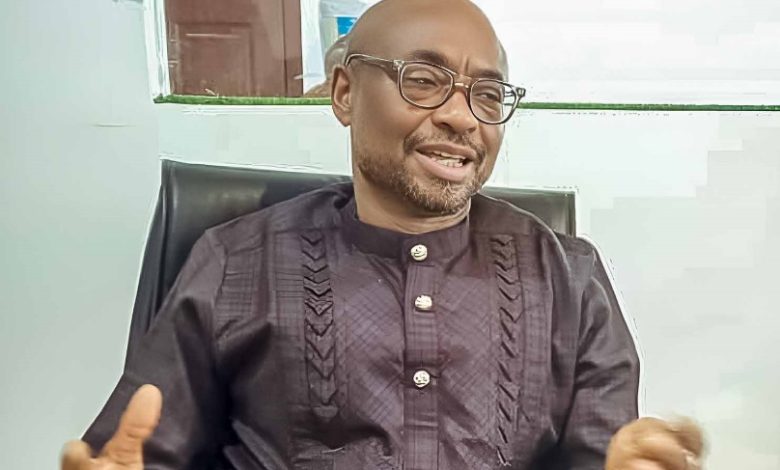
Professor Otoabasi Akpan is the acting Vice Chancellor of the Akwa Ibom State University (AKSU), at Ikot Akpaden, Mkpat Enin Local Government Area, with a campus at Obio Akpa in Oruk Anam Local Government Area. He exudes sterling qualities as an academic and an administrator. He is a prolific writer and critical thinker who has made a significant impact in the fields of History and International Studies, particularly in the sub-fields of the History of Ideas and International Security Studies. In his teaching career, he has produced over 20 professors, several ambassadors and numerous generals, security and intelligence personnel.
With an extensive publication record, Prof. Akpan has over 103 articles in reputable journals, book chapters and conference papers, locally and internationally. In June 2024, he delivered the 5th Inaugural Lecture at Akwa Ibom State University, presenting on the topic “Thinking the Thinkable for Gatekeepers at the Gateways.” He has made significant contributions to national development by visiting 22 universities to assist with accreditation for the National Universities Commission (NUC).
Prof. Akpan is a member of several professional organisations, including the World History Association, the African Studies Association in the United Kingdom, the Nigerian Institute of Management, and the African Studies Association in New York. He is a global citizen and has travelled to over 100 countries on all continents of the world except Antarctica.
He is also the National President of the College of Professors in Nigeria (COPiN); Dean of Ibibio Academics Roundtable, Chair of the Mary Slessor Institute for African Policy Studies; Chair of the Global Society for the Study, Preservation and Promotion of the Cultural Heritage of Africa; Emeritus President of the Pan African Historical Society; Member of Eminent Persons and Experts Group Meeting on Complex Insurgencies in Nigeria.
In this exclusive interview with the editors of Crystal Express newspaper, Professor Akpan, a cerebral academic, discusses his vision and development plans for AKSU, seeking to make it research-centric and to consolidate the transformation of the state-owned varsity into a globally competitive institution. He speaks broadly on infrastructure development, staff and students’ welfare, postgraduate programmes, administrative policies, entrepreneurial initiatives, establishment of institutes and centres, and agricultural research – aligning with the ARISE Agenda, the development blueprint of Governor Umo Eno’s administration. It is a must-read. Excerpts:
The Akwa Ibom State University has come a long way. After its inception as a science-based institution, it evolved into a conventional university, and it has not been easy to come this far. Now, the mantle of leadership is on your shoulders. What is your vision for the university? Where do we expect the university to be in a few years?
Thank you very much for having me, and I also thank you for your concern about the fortunes of Akwa Ibom State University (AKSU). Like you rightly pointed out, the state university was first started by the Obong Victor Attah’s administration as Akwa Ibom State University of Technology. The institution’s name was later changed to Akwa Ibom State University by his successor, Governor Godswill Akpabio, who expanded it to become a conventional university with two campuses, one in Ikot Akpaden in Mkpat Enin LGA and the other in Obio Akpa in Oruk Anam LGA.
As of today, we have a staff strength of 1,500 and a student strength in excess of 11,000. So my vision for the university is to develop it in all ramifications, to the extent of competing with other universities in the world. And of course, you know, once a university has accreditation of all its courses by the regulating body, it can favourably compete with other universities, to the extent that if a student is in one university, that student can also be compared with graduates of other universities, because all universities run almost the same curricula with minor differences.
Otherwise, it is a universal institution. What you have here is what you have elsewhere. So right away, the vision is to develop it to such an extent that the stakeholders, and most especially the students and graduates, will feel that, after all, even though they are educated in Nigeria at the tertiary level, they can easily compare themselves with others outside the country, and that means that we’re going to operate a research-centric university, because these days, it is research that points out what you need to do. And universities exist to solve problems. You cannot say that you know everything until you have findings from research outcomes. So for us, that’s the way to go. And because it is located in Akwa Ibom State, and it is also owned by Akwa Ibom State, we have looked at the philosophy of development of the state, which is the ARISE Agenda, and to that extent, we have aligned our policies, administrative policies and researches with the ARISE Agenda, because the university must help the society, and in this case, we’re talking about the state which owns it.
So that’s the vision. If we can achieve more than 70 per cent of this, then the university will be highly developed. As of now, the university does not have a single hostel. It doesn’t have a single building for staff accommodation, and for me, it is part of my blueprint to build several hostels and also to build quite some staff quarters. In saying this, maybe one would wonder where the funding will come from. The university is not an island, entirely on its own. No, it develops through linkages and collaborations with individuals, local authorities, sub-national, national and international bodies. We have wealthy individuals who are interested in developing the university, and we have actually met with some of them.
Just last week, a group of lawyers came on a courtesy call. They want to build facilities for us to start a law programme without any kobo from the university. Alright, that’s why we talk about individuals. Our university is hosted by five local government areas. In the main campus, we can mention Eastern Obolo, Mkpat Enin and Onna. Then in Obio Akpa, you have Ukanafun and Oruk Anam. So we hope to collaborate with them to see the extent they can assist in the development of the school, along the lines of our blueprint, and of course, for the state; the state has tried significantly in laying the foundation for the development of the university. For the National, we have TETFUND (Tertiary Education Trust Fund), and we also have some other interventionist agencies. Last week, the Federal Ministry of Education came for inspection on the NEED Assessment projects. We strive to expand the levels of these collaborations to fulfil our needs or the highlights of the blueprint.
What about affiliations and collaborations with other renowned institutions across the world?
We’ve been having collaborations with institutions around the world. I think between 2017 and 2022, I was the director of International Collaborations and Linkages, and the directorate was like a window to the world, a window of the university to the world. And then in 2019, we travelled to China for collaboration with the South Sea Institute of Oceanography in Guangdong, China, and we were supposed to go back in 2021, but COVID-19 didn’t allow. This came with some good money, dollars and equipment, and even though we had stoppages as a result of COVID-19, this year, we are going back to China. They have just sent us an invitation letter to come back. Initially, it was supposed to be a question of this year, we go to China, and next year, they will come to Nigeria. But it’s like we are starting all over again as a result of COVID-19. We have collaborated with Temple University, USA. We’ve collaborated with many institutions, including those in India and the UK. In 2018, I sent some staff to universities in the UK for exchange programmes.
We have also been sending students on exchange programmes, so we have robust linkage systems with other universities around the world. Even as I sit here, there are two universities from Australia wishing to collaborate with us in agriculture, and then I will also mention some international organisations that are also interested in collaborating, mostly in agriculture. We have funding as a result of exchange programmes. And I know that even last week, I signed approval for the Faculty of Agriculture to use funds for the programmes as designed by the donor agency.
Your university has come of age. What is the accreditation status for the courses you run in the institution? Secondly, do you run post-graduate studies up to PhD level?
Thank you very much for that question. We have 43 programmes, and all of them have full accreditation. We also have the Post-Graduate School. Many departments run post-graduate programs up to the PhD level. We have been graduating PhD holders. But even when I said that we have 43 programmes, at the first senate meeting that I had on August 18, 2025, after coming on board, I unbundled two departments and made them faculties. One, the Department of Mass Communication is now the Faculty of Communication and Media Studies with nine departments. Then, I also unbundled the Department of Computer Science. We now have the Faculty of Computing and Information Technology. We now have seven departments. Very soon, we will invite the National Universities Commission (NUC) for resource verification, so that from the next session, we’ll admit students into the various programmes.
I can say that by next year, we are going to add a total of 16 programmes to the university, and that means some high levels of expansion of disciplines and again, next year, we’ll move to make sure the university starts a process, or concludes a process, of having three other faculties; Faculty of Law – I have mentioned the plan by some individuals in that direction, College of Medicine and Faculty of Environmental Studies. And we’re doing this because we recognise the fact that it is not a specialised university. It is a conventional university. So we have to bring these programmes for the benefit of the Akwa Ibom people. And this will fall in line with the ARISE Agenda of the present government.
Gov Umo Eno’s Achievement In 2 Years Far Exceeded Expectations
… We’ve To Support, Inspire Gov Eno To Do More
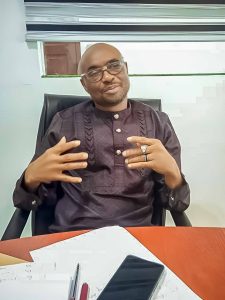
You’ve talked about the development of facilities. How far with the development of the permanent site?
It’s been developed quite exceptionally, to the extent that if you visit the place, you will see beautiful structures. Of course, some of these structures are sponsored by TETFUND. We have what is called the Ship House. It is a special intervention project, and I can tell you that in the entire South South region, no university has such a building where even heads of departments’ offices are bigger than what we have here, and all the rooms have intercom services, and they also have this electronic dashboard for teaching. So, it was through the efforts of our former Pro-Chancellor, Senator Udoma Udo Udoma. We also have buildings for other faculties, like engineering, and I know that as of now, most of those departments and faculties have moved to the permanent site. It is a beautiful landscape to behold.
Are you (the VC) there at the permanent site?
No, I’m not at the permanent site yet. We intend to construct a Senate building at the permanent site where the Vice Chancellor’s office will be.
There was a time when a building constructed for students by a philanthropist generated some political controversy. Has it been resolved?
I wouldn’t know the one that you’re talking about. I know that efforts were made by the Godswill Akpabio Administration to build hostels in the two campuses, but they weren’t completed at the time he left office. But I also know that Obong (Engr) Asuquo Udofia, who was once our Pro-Chancellor, donated a building. The value is in excess of one billion naira for students. On October 25, 2025, the hostel will be handed over to the university. The governor of Akwa Ibom State has been informed, and we, too, have been informed by the donor, the DESICON Group.
We understand that for some time now, graduation/convocation has not taken place. Any plans for that soon?
It is a result of logistical circumstances. We didn’t have convocation for six years, and it is quite worrisome, and that is why one of the things we desire to do is to have the convocation within the year. We’ll have to combine the convocation covering the period.
Your university has recorded some level of labour unrest. Sometimes, lecturers/staff are at loggerheads with the school management, by extension, the state government, over conditions of service, including the implementation of the minimum wage. Have these issues been resolved?
Normally, in an institution, you will have challenges, and where you have people working, they constantly need to have robust welfare services. When we have gaps, they may decide to point them out. And I thank the union leaders in the university, because they understand the management most of the time. And that is why labour relations are always well managed in the university, and whenever they have issues like that, the state government, which is our proprietor, will intervene and set templates for peaceful resolution.
Yes, as we speak, the state government was kind enough to set up a technical committee, made up of union leaders and commissioners from different ministries and even their permanent secretaries. And I can tell you that as of now, they have finished with the report that they have to submit to the governor for consideration. It’s been an issue of the labourers asking for several things that they think they deserve, and the government, being the paymaster, would also make some suggestions and considerations. At the end of the day, it is a question of where you are not totally satisfied, you’re not absolutely dissatisfied.
Another problem that has plagued universities all over the country is the issue of cultism and students’ unrest. Does AKSU experience this, and how do you tackle it?
First of all, we’ve been so lucky in the sense that we’ve never had students’ unrest ever since the university was established. It has to do with the resourceful management of relations between staff and students, between the management team and students. So never for once has there been student unrest. Then, the other challenge that plagues the system, almost all universities, is the issue of cultism.
For us in Akwa Ibom State University, we’ve not recorded large-scale disturbances, occasioned by cultism, in the sense that students don’t live within the campuses. They live outside. And when you have disturbances, you can never easily distinguish between students from our institution and the youths of the communities. So that is where we have the dilemma, and even at that, we try to sensitise our youths, our students, against membership of cultism. And for us, it is zero tolerance.
Once you are caught and there is clear evidence of involvement, then we show you the way out. We dismiss you. We don’t suspend, but dismiss. And for me, I see cultism as support or solidarity groups among the members. So what we are doing is to establish several clubs for students, mostly sporting clubs. Firstly, you have the cycling club, and I’m the patron. I’ll donate about four bicycles, and I will also ask philanthropists in our society to support.
Yes, we’re going to have a swimming pool club, and there is an organisation that will build an Olympic-sized swimming pool for us. So we have a swimming pool club. We also have badminton, basketball, table tennis, lawn Tennis and other clubs. And we made it compulsory that students must belong to a club, any of these clubs. Like I said, cultism, when you understand the dynamics of it, has to do with a support system. Youths have an abundance of energy. So we want them to channel this to productive aims. That is why we established almost 21 clubs. Many of our staff have donated facilities for such clubs as Scrabble. You have a scrabble, table tennis and so on and so forth.
We believe that if we galvanise all of them towards one particular area, I mean, gradually, they will say no to cultism. It is good to talk to them and sensitise them while they’re still young, while they’re new to the system.
The Visitor of the university is the Governor of Akwa Ibom State, His Excellency, Pastor Umo Bassey Eno. You’ve talked on keying into his ARISE Agenda. What’s your impression of his person about the ARISE Agenda policies?
Thank you very much for that question. You see, when Pastor Umo Bassey Eno indicated interest in vying for the seat of governorship, the first thing one would have to look for was his blueprint. What kind of blueprint did he have? And with the ARISE Agenda, we saw clear direction towards a destination. And for me, he knew what he was doing, because it tallies with the first law in avionics for the pilot, which is “Don’t take a plane to any destination that your brain has not first visited. You know the reason? Because you may have challenges on the way, and you will build your reflexes. You will know whether you can have an emergency landing or whether you may not even be able to land at all. Then you think of what to do so that you won’t be surprised by any incident. So don’t take a plane to any destination that the brain has not first visited. So when Pastor Umo Bassey Eno came with the ARISE Agenda, we saw four years ahead of him, and we could, you know, organise and classify some of the things that he needed to do, generally speaking. And when he celebrated his two years in office, a few months back, some of us saw that it was even beyond two years. What he has accomplished for the state under his tenure was far beyond two years. We were there at the Banquet Hall of the State House, and these programmes were reeled out, you know, for us to see what he’s done in two years now. For the educational sector, if you move along, even our highways, which are visible enough, you will see evidence of the remodelling of some of those schools to modern standards with modern facilities. Yes, we have schools numbering hundreds, but you must start somewhere, because government is a continuum. Some other person will continue. But I know that, in doing this for two years, he’s done much.
Then, for us, we have to inspire him and encourage him to do more. We have seen his impacts on the schooling system, secondary school and the primary school. For the tertiary institutions, efforts have also been made in order to take them from the level at which he met to a higher level. And we see that these efforts are quite positive, and before long, we’ll have expected gains, and normally, with his blueprint, the expected gains will be more than what was envisaged ab initio.
His initiative in agriculture, which we also want to key into, is top-notch. He has done so much. I think, on the first of September, we were there in the covenant prayers meeting when he told us about his plan in the oil palm industry. He has about 1 million palm seedlings for Akwa Ibomites. And the idea is that they come to your house. You show them the land. They are the ones to even plant. They come to you and they replace the old ones with these new ones, which would mature in 18 months. So extension workers will go to the villages, and you know, destroy the old ones and plant the new ones.
So if we can do that through the encouragement of His Excellency, we’ll move forward greatly. We’ll quicken the process of development. And I tell you that Nigeria owes its existence to the oil palm. British interest in the Niger Delta evolved from the exploitation of abundant palm oil for industrial purposes. That’s another matter to discuss.
And again, for me, it is highly symbolic that in 1948, Malaysia took palm seedlings from our Obio Akpa campus, which at that time was an agricultural station run by the British. Today, Malaysia earns in excess of $50 billion from farming oil palm, and Indonesia also earns it. Today, Indonesia is even number one in oil palm, earning 60 billion dollars. So, Akwa Ibom can go back through this ARISE revolution, to have many mills, many refineries, and people will have jobs.
There is no point in time when people don’t have needs for oil palm products.
So, I think in that direction, those who know, should give the governor a pat on the back. And we are interested in assisting the state, which is why, on the first day that I had a senate meeting on the 13th of August, we established a number of institutes and centres to help in research. If you remember, I said that we are committed to building a research-centric university. So we have the Institute of Agricultural Research, the Institute of Oil and Gas and Renewal Energy, and the Institute of Marine Research and Blue Economy. These, collectively, will help the state and the ARISE Agenda significantly. We also have several centres that will be created, and then we have institutional or legendary names of our people attached to the centres. For instance, we have the Wellington Bassey Centre for Defence and Security Studies. We have the Philip Effiong Centre for Peace and Conflict Studies. We have the Emma Brown Centre for Gender and Sexuality Studies. We have the Nyong Essien Centre for Local Government and Chieftaincy Studies. We have the Sam Akpabot Centre for the Creative Economy and Cultural Studies. We have the Christiana Essien Igbokwe Centre for the African Arts and Festival Studies and so on, down the line. All the governors have centres. We have about 20 such centres.
And we believe that these centres, being the hubs of research, would help the state significantly and would also raise the image of the university. The Ahmadu Bello University (ABU) has in excess of 100, and the University of Abuja has in excess of 70, as we are just beginning with the 20. But I know that these are all self-funding centres; once you give them the seed money, we believe they will go on their own and develop.
As we speak, the Christiana Essien Igbokwe Centre for the African Arts and Festival Studies will be organising two festivals at the end of this year. And once they start, it will become an annual festival. Other centres are also ready to start their own programmes. And for the Philip Effiong Centre for Peace and Conflict Studies, we intend to have annually, the Philip Effiong Peace Prize. Of course, you know the role he played in conflict resolution during the Nigerian Civil War.
We Have Robust Exchange Programmes With Highly Rated Varieties Worldwide
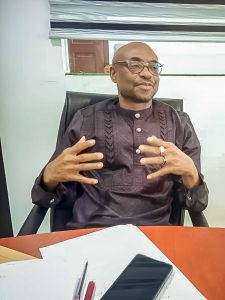
…Are these centres visions of your administration?
Yes, vision of my administration, but the law permits us to do that. Section 9 of the Law of Akwa Ibom State University mandates us to establish institutes and centres for the promotion of the university mandate, most especially in the field of research. But for me, like I said, we want to have a research-centric university, and centres and institutes help a lot to source funds in order to develop and engage in research.
Universities engage in enterprises that help bring in internally generated revenue (IGR) for them. In addition to your programmes, is AKSU evolving enterprises to boost its finances and render services to the community?
Yes, thank you very much. Many universities do quite a number of things. Ideally, the university has about 21 sources of income. Yes, businesses are sources. You have property, you have donations, you have linkages or collaborations and so on. So, for us, let me put it this way: a university is a sleeping giant. Yes, you wake it up with thoughtfulness in terms of the right commercial leadership, because no matter how much you are given by the sponsors, it will not be enough. It can never, ever be enough, which is why we engage in all this research, I mean these institutes and centres, and I can tell you the value of these centres is in excess of 5 billion naira, once we start. So in other words, one could do water and bring money, and others could do the garment industry and bring money.
But for ours, we want to start with these research centres that I said are self-funding. Yes, self-funding. For instance, the Willington Bassey Centre for Defence and Security Studies will meet with some persons, and they’re interested, because some of these centres would engage in PGD, Master’s and PhD. Many in the security industry, in the army, the intelligence, the police and other para-military services would want to study there. And what do you think that would amount to? The end state is funds for the university. Contemporary universities don’t wait for their proprietors, for the government. In fact, in America and to a larger extent, the UK, what we have as tuition fees will go for 25 per cent of what you need; grants from the government will go for another 25 per cent. So you have to look for the 50 per cent that you need. So this is why we move into the establishments of institutes and centres. You know, like the University of London is the owner of the London Boat Club. It is also the owner of several squares in London. Even though its main workforce is not up to 7000, it employs 40,000 people from other activities. And that also means it contributes significantly to the economy of the UK, and that is how universities should go, to use their initiatives, or the initiatives of their staff, in order to get what they want, which is why I say university is a sleeping giant.
If anybody, any entrepreneur, can make multiple millions, a university will double, because of its name. A university would use its name. So for us, I think before the year ends, or at least the first quarter of next year, our guest house in Ewet Housing Estate will be commissioned, and that would be, you know, a business arm of the university.
As you know, almost every month, we have visitors, of course, from NUC, from TETFUND, from the Ministry of Education, from a number of interventionist agencies and so on and so forth. So we feel we have to have a guest house. Incidentally, the land has been there for years. It was bought about eight years ago, almost 1,500 square meters, and is located in a choice place. APICO came and threatened to take over the plot because we didn’t develop it. And we moved in like a lion to develop the place. And we’ve seen an organisation, in fact, a bank that is going to sponsor the building of the guest house, a 30-room modern guest house.
We would like you to tell us who you are for the benefit of those who may be coming across you for the first time.
I am Professor Otoabasi Etim Akpan from Itu Local Government Area of Akwa Ibom State. I attended many primary schools in the Ikot Ekpene and Uyo areas by virtue of my parents being teachers, but finished at Government Primary School, Moninya, in the old Western Region in 1974.
I obtained my Senior School Certificate at Lutheran High School, Obot Idim, in 1979 and earned a Bachelor of Arts in History from the University of Calabar in 1984. I proceeded to the mandatory National Youth Service (NYSC) at the Advanced Teachers’ Training College in Kafanchan, Southern Kaduna. In August 1985, I enrolled for a Master’s degree programme in the history of Ideas at the University of Ibadan and finished the programme in just eight months, and my dissertation became a reliable model for postgraduate students’ research for many years.
I was appointed as a research assistant to Professor Jan George at the London School of Oriental and African Studies (SOAS) in London, where I worked from August 1986 to May 1987. After this brief period, I became the Dean of Studies at Akpur College in Ikyurav-Shange Tiev, Gboko, in Benue State. While at the college, I enrolled for a post-graduate diploma in education (PGDE) programme at Ahmadu Bello University in Zaria. In 1989, I joined the Post-Graduate School at the University of Jos for a Master’s programme in international relations and strategic studies, completing it in just eleven months. I worked as a research executive at Brains-Trust Research Consultants Incorporated in Lagos from January 1994 to April 1996. In February 1997, I began my career in academia as an assistant lecturer at the University of Uyo, where I played a key role in incorporating an international studies component into the department’s curriculum in 1998. I achieved the highest level of academic inclination by earning a Doctor of Philosophy in diplomatic studies in 2003 from the University of Port Harcourt.
I returned to the University of Uyo to enhance my career in the Department of History and International Studies for 10 years before joining the services of Akwa Ibom State University in 2013. At Akwa Ibom State University, I served as the first head of the Department of History and International Studies, the second dean of the Faculty of Arts, and the pioneer director of the Directorate of International Collaborations and Linkages, where I facilitated collaborations with the University of Innsbruck, Austria (2018); Temple University, Pennsylvania, United States (2018) and South China Sea Institute of Oceanology, Guangzhou, China (2019).
I also served as Vice Chancellor (Academics) and a key member of the Governing Council of AKSU. By the grace of God, my contributions have significantly shaped the university’s academic landscape, providing leadership and mentoring for younger academics to the limelight. As it pleases God, His Excellency, the Governor of the State, Pastor Umo Bassey Eno, appointed me Vice Chancellor, in acting capacity for now, a few months ago.
Any other thing you may wish to add?
I have what I want to say by way of thanksgiving. Let me put it this way: I’m so lucky. I found myself highly privileged that I achieved two goals that any lecturer wishes to achieve, not professorship. The fact that we have two roles to play ultimately. Firstly, the academic ends with an inaugural lecture, and the administrative part ends with the Vice Chancellorship position. Many are Vice Chancellors but have not done an inaugural lecture, and many have done inaugural lectures but don’t end up with a vice chancellorship position. So through the grace and mercy of God, I’ve been able to achieve the two, and that is why, and I’m so fulfilled, and which is also why I give my best, my very best, to the university. And like I told them during the first senate meeting, I said, I am highly exposed, and I will use conventional methods – university convention, international best practices, experiences that I have garnered and exposure in order to develop the university. I’ve been to more than 100 countries, and I have interacted with many academics on all continents of the world, except Antarctica. So I know what the system needs. I know the university system as I know my palms, which is why, just one month into the office, we’ve been able to achieve this. It pleases God that I serve. Today is September 8. You come back in two years, and I will ask you to assess us, the university. By then, you’ll know that I never made claims that I know what I was talking about.
In the course of your leadership, the University Senate approved the appointments of associate professors and professors.
Yes, normally every year, we send documents, publications of those aspiring to be associate professors and professors, to external examiners, normally three, blindly sent. And when you have two positive recommendations, we announce you. It was a programme that was started by my predecessor. I inherited them, and of course, I did the needful.

